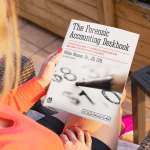Consulting vs. Testifying Expert Witnesses: Why it Matters (A Lot)

The Forensic Accounting Deskbook by Miles Mason, Sr. JD, CPA, published by the ABA Family Law Section
What is the difference between an expert consultant and an expert witness?
For more, see Testifying Experts vs. Consulting Experts in Divorce Cases. And, see The Forensic Accounting Deskbook: A Practical Guide to Financial Investigation and Analysis for Family Lawyers, Second Edition, authored by Miles Mason, Sr. and published by the ABA Family Law Section. This updated edition of one the ABA’s most popular resources explains the practice of forensic accounting and business valuation and how to apply it in family law cases. It provides a practice-focused introduction to the core financial concepts in divorce, such as asset identification, classification, and valuation, income determination, expenses, and more.
VIDEO TRANSCRIPT:
Tracy Coenen: I understand there is something called a consulting expert, and there’s something called a testifying expert. Can you tell us the difference between the two?
Miles Mason: Right. And there are a lot of attorneys that have different ideas about this. But what’s important for the forensic accountant to know is that a consulting expert does not have to be disclosed. It’s considered within the attorney work product. And once you’re within the attorney work product universe, then that doesn’t have to be disclosed to the other side, because its thoughts, ideas, concepts in the litigation strategy, working towards presenting a case. So it’s not non-discoverable. But once an expert witness becomes a testifying expert, everything that that expert sees, hears, touches, thinks, writes, or is presented is discoverable. And that means they could be questioned about it along the way.
Thank you to Tracy Coenen, CPA, CFF for inviting me to join her in this video series. Tracy is a nationally recognized forensic accountant practicing in Milwaukee and Chicago.









